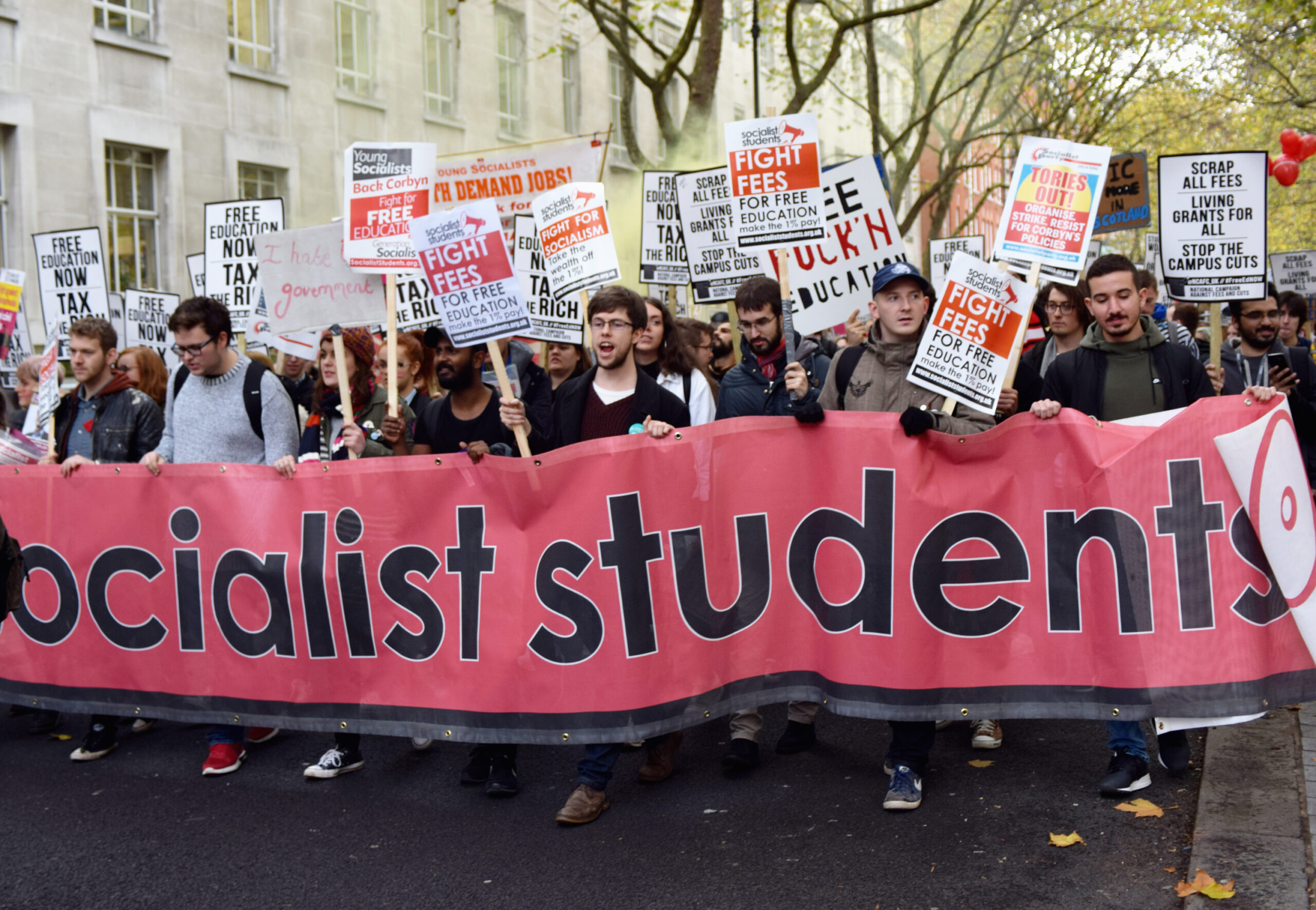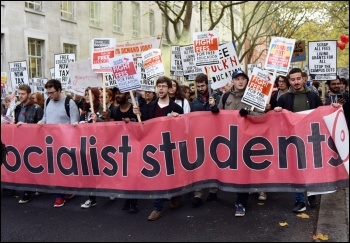Theo Sharieff National chair, Socialist Students
Prime Minister Theresa May has proposed cutting tuition fees for some students.
Possible changes include lowering fees for students in England to £6,000, paid for by cutting the already meagre support for disadvantaged students. Another proposal is charging less for humanities courses compared with degrees which tend to produce higher earners.
None of these options mean free education, and they all could further limit working class students’ access. But why does May feel pressured to talk about reform?
Jeremy Corbyn’s strength after the general election is the Tories’ weakness. His anti-austerity stance has swelled Labour to 570,000 members, and he enjoys the support of the vast majority of young people.
But the Tory party – which some of its own activists believe has plummeted below 70,000 members – only retains majority support in the 65+ age bracket, according to YouGov.
Millions of young people voted for extending public ownership in key services such as the railways and energy; kicking ‘PFI’ out of the NHS; scrapping tuition fees, as part of a wider system of free education “from the cradle to the grave;” and launching a programme of affordable home construction.
These are steps in the right direction. But unfortunately Corbyn has not yet capitalised on the impetus and mood which were building in the run-up to 8 June.
If Corbyn gives a lead – addressing directly the millions of young people and workers who voted for him, calling for mass protests and building for strikes by students and workers – they could finish the job they started at the ballot box.
However, the leadership of the National Union of Students (NUS) – the national body which around 600 further and higher education students’ unions are affiliated to – is dominated by Labour’s Blairite right, the enemies of Corbyn’s anti-austerity politics.
Student movement
NUS leaders have failed to use their massive resources to coordinate and lead student protests. Not only this, but they have even refused to officially support pre-existing student demonstrations for free education.
But in the face of the NUS’s cowardly retreats on the national plane, many students have moved into determined local action. At the end of 2017, movements developed on a number of campuses against excessive vice-chancellor pay.
Bosses’ pay increases were accompanied by vicious attacks on lecturers’ pensions nationally, and job cuts locally at many universities. So the news that some university executives receive over £400,000 a year provoked a reaction from workers and students alike.
Spontaneous movements of students and workers developed on a number of campuses, most notably at the University of Bath. Demonstrations of hundreds at Bath forced Dame Glynis Breakwell, who was earning £471,000 a year, from her post.
Following Breakwell’s resignation, Sir David Eastwood, the vice-chancellor of the University of Birmingham, became the new highest-earning university chief – on a salary of £436,000. He had overseen 70% of teaching staff moving onto zero-hour contracts, and support staff’s wages falling by up to £1,800 in real terms.
A ‘Vice-Chancellor Question Time’ event gave students a chance to grill Eastwood. One Socialist Students speaker received rapturous applause for putting the question to Eastwood: “When are you going to resign?”
Eastwood will no doubt come under further pressure over the course of the ongoing national strike by the University and College Union (UCU) against attacks on pensions at the pre-1992 universities. He receives £90,000 a year to chair the national university pension scheme in question.
At the University of Southampton, Vice-Chancellor Chris Snowden received £81,000 more in 2017 than the year before. A student poll found 90% in favour of giving him a pay cut, while 92% voted to oppose 75 proposed job cuts at the university.
Socialist Students in Southampton played a fantastic role in reaching out to other student groups on campus, as well as the UCU branch. We have initiated a campaign to defeat the job cuts and force the resignation of Snowden.
UCU strikes
Meanwhile, lecturers across dozens of universities are preparing for strikes.
The result of the UCU’s national ballot for action against pension cuts smashed the Tories’ anti-trade union laws. 88% voted for industrial action on a turnout of 58%.This is further testament to the mood to fight which exists among broad layers of our society.
What’s more, this action could give confidence to other workers on campus, such as support staff, both inside and outside the trade unions, to fight themselves. The 14 days of strikes planned are a very welcome step forward as contrasted with some previous nominal strike action by UCU.
Socialist Student groups across the country will be attending the picket lines, offering solidarity to strikers, and hosting joint meetings with strikers and UCU representatives, to discuss the next steps in a strategy to fight the Tories and defeat the pension attacks.
Students are clamouring to get involved with any issue they think they can fight and win on. While students have seen NUS leaders retreat on the question of building a student movement nationally, they have proved on more than one occasion that where a battle is to be had, they will move into action.
The weaknesses and splits within the Tory government on many issues; the popular demand for free education; the vice-chancellor pay scandals; the UCU pensions strike – these are the ingredients of a mass movement.
The question is: how can they be linked up with workers and translated into a national movement which challenges the government directly? Could this potential be harnessed, and led to defeat the Tories, helping to force an early general election and usher in a Corbyn-led anti-austerity government?
Socialist Students says the leadership of the NUS must use its resources, profile and mass membership to initiate a mass campaign for free education and against marketisation and privatisation. As a start, it should use the opportunity of the UCU strikes to call co-ordinated student walkouts and demonstrations in support.
Jeremy Corbyn should use his huge authority to call for these measures too – especially if NUS’s right-wing national leaders refuse.
Local elections
But the role of students in fighting the Tories doesn’t begin and end at the boundaries of the university campus. In this May’s local elections, students and workers will be looking for a chance to vote for the same clear, anti-austerity alternative they backed in Jeremy Corbyn eight months ago.
How will the youthquake which took place then be translated into this May’s local elections? The vast majority of Labour councillors oppose Corbyn’s programme, and continue to spread the myth that there is no alternative but to implement Tory cuts.
The Labour Party is two parties in one. The anti-austerity party in formation around Corbyn and the new mass membership needs to kick out the pro-capitalist, pro-fees old party which controls the NUS and includes the majority of Labour MPs and councillors.
Welsh Labour, for example, has the power to scrap tuition fees in Wales right now. But it refuses to do so!
The enthusiasm for Corbyn’s anti-austerity alternative cannot survive indefinitely on a diet of empty promises. Many young people are deeply dissatisfied with simply waiting for the government to collapse.
And with the Tories so clearly on the back foot, they are searching for a way to play their part in consigning May’s government to history.
Some will have seen that since the general election more local communities have challenged the idea that cuts and privatisation cannot be fought.
In Haringey, Labour members have replaced council candidates who backed the ‘HDV’ housing privatisation scheme. In Bristol, the Labour mayor led a march against the cuts – which he was making – while Labour members are discussing pushing for a no-cuts council budget.
Left-wing Labour MP Chris Williamson, one of Jeremy Corbyn’s few allies in parliament, raised the idea of using council tax increases to fight cuts locally. Unfortunately this is not a viable method for avoiding the impact of austerity, but it does show willingness to look for one.
Fight Tory cuts
The net effect of all these experiences is that the idea that Labour councils can fight Tory cuts is gaining authority.
Corbyn should call on Labour councils to adopt the strategy proposed by the Trade Unionist and Socialist Coalition (TUSC), the electoral alliance including transport union RMT and the Socialist Party. By using reserves and borrowing powers to stop austerity now, councils can buy time to build a campaign to win the money back.
As part of this, Labour councils should build campaigns against ‘academy’ privatisation of schools, cuts to further education, and for the reinstatement of the Education Maintenance Allowance. This would give real confidence to young people that by getting organised, we can win.
By building campaigns which challenge pro-austerity candidates at May’s local elections, as well as a national student movement linking up the battles unfolding on our campuses, we as students and young workers can help consign the Tories to history.
These are but a few of the big political questions facing the student movement and young people in general which we will be discussing at this year’s Socialist Students conference.
- Socialist Students national conference: Saturday 24 February, 10am to 6pm, University of Birmingham, Guild Council Chamber, Edgbaston Park Road, Birmingham B15 2TU








